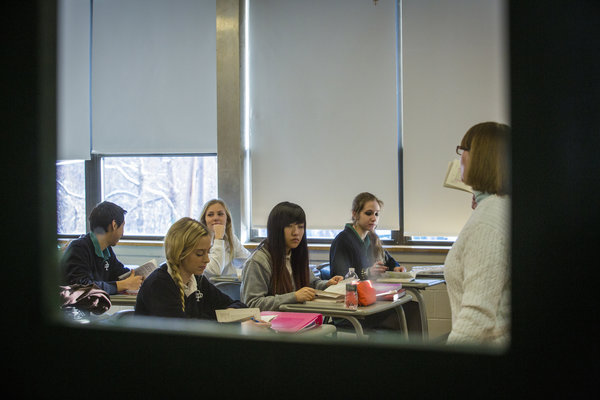(单词翻译:单击)
How would Sainiya, a 14-year-old girl from the Chinese region of Inner Mongolia, cope with life in a European boarding school? The question from a woman working in admissions at a prestigious school in Ireland provoked incredulity from Sainiya’s father, He Xiongfei, a Beijing publisher.
来自中国内蒙古的14岁姑娘塞尼娅(Sainiya),怎么能应付欧洲寄宿学校的生活?爱尔兰一所名校负责招生工作的一位女士提出的这个问题,让塞尼娅的父亲、身在北京的出版商贺雄飞感到难以置信。
‘‘She’s been in boarding school since she was 3,’’ he said, as if that settled it. But did it?
“从3岁开始,她就在寄宿学校上学了,”他说,似乎这一点能回答上面的问题。但事实是这样吗?

Mr. He is one of thousands of Chinese parents each year who choose an overseas education for their children, hoping they will learn world-class skills grounded with liberal, democratic values in a healthy environment.
每年都有成千上万的中国家长为孩子选择海外的教育,希望他们在健康的环境中,以自由和民主的价值观为基础,学习世界级的技能。贺雄飞便是其中之一。
He’s also one of millions of parents who have sent their children to ‘‘boarding kindergartens,’’ a tradition that began after the 1949 Communist revolution, where children as young as 3 (occasionally even 2) live at school during the week — sometimes, but not always, returning home for the weekend.
他也是将孩子送去“托儿所”的数百万家长之一。这种传统始于1949年的共产党革命,只有3岁大(有时甚至是2岁)的孩子一周都待在学校里,有时会回家过周末,但并非总是如此。
Sainiya appeared to do fine during the year she spent at St. Columba’s College — except for the food, which she disliked. But the jury is still out: Emotional trauma can be harder to detect than an aversion to boiled vegetables.
在圣哥伦比亚学院(St. Columba’s College)的那一年里,除了不喜欢那里的食物,塞尼娅似乎适应得很好。但这个结论恐怕并不明确,因为比起对水煮蔬菜的厌恶,情感创伤更难察觉。
In China, a new generation of young, Western-trained psychoanalysts is concerned that early childhood separation from parents or primary caregivers, considered normal here for generations, has caused profound, hidden trauma in millions of Chinese.
在中国,新一代受过西方教育的年轻精神分析学家担心,幼年与父母或主要看护人分开的做法,给数百万中国人造成了深刻而隐秘的创伤。在这里,一代又一代人都认为,这样做是正常的。
They believe early separation, a documented psychological phenomenon, has led to emotional problems in adults who may fail to form healthy relationships. Feeling abandoned as children, they struggle with worthlessness and depression.
这些专家认为,早年与家人分离作为一种有文献记录的心理学现象,在成年后造成了情感问题,他们可能无法形成健康的家庭关系。觉得幼时遭到抛弃的他们,会深深地觉得自己没有价值,感到沮丧。
Trying to help fix China’s soul, Liu Yiling, an analyst accredited with the International Psychoanalytic Association; Dr. Zhong Jie of Peking University; and Dr. Wang Xiao of the Tavistock Center in London are holding two public lectures and a four-day seminar next month at Peking University titled ‘‘Early Separation and Psychoanalysis.’’ These are for people who want to learn more about themselves and those considering a career in psychoanalysis.
下个月,国际精神分析协会(International Psychoanalytic Association)认证的分析师刘翼灵、北京大学的钟杰博士和伦敦塔维斯托克中心(Tavistock Center)的王虓博士将在北京大学举办两场公开讲座,以及一场名为“精神分析中的早期分离”的研讨会,研讨会将持续四天时间。他们试图以此帮助修复中国的心灵。这些活动面向的是那些希望更深入地了解自己,以及考虑以精神分析为职业的人。
China built many ‘‘boarding kindergartens’’ after the revolution in order to free parents, especially mothers, to work outside the home, part of the official goal of women’s emancipation that in reality was geared to the needs of the Communist Party.
那场革命结束后,为了给家长,尤其是母亲们腾出时间,让他们能离开家门去工作,中国修建了许多“托儿所”。让母亲们走出家门是解放女性这个官方目标的一部分,但实际上是为了满足共产党的需要。
The phenomenon reached a peak during the Great Leap Forward from 1958 to 1962, when children were boarded in droves as Mao Zedong ordered China to outstrip the United States and Britain through agricultural collectivization and industrial production.
在1958年到1962年的大跃进时期,这种现象达到了顶峰。当时,毛泽东下令中国实行农业合作化和加大工业生产,从而超越美国和英国,于是许多孩子被送去了寄宿学校。
In ‘‘Mao’s Great Famine,’’ the historian Frank Dikötter documented appalling conditions in kindergartens of that time. Hunger, disease and neglect were common.
在《毛泽东的大饥荒》(Mao’s Great Famine)一书中,历史学家冯客(Frank Dikötter)记录了当时幼儿园骇人听闻的情况。饥饿、疾病和玩忽职守的现象相当普遍。
Today, separation trauma may also be caused by the widely accepted cultural practice of giving children to grandparents to raise, so parents can work long hours amid intense economic pressures, Ms. Liu said.
如今,把孩子留给祖父母抚养,好让承受着巨大经济压力的父母长时间工作的做法,在文化上也被人普遍接受。但刘翼灵称,这种做法可能也会造成分离创伤。
‘‘Everyone says it’s fine for the grandparents to raise the kids,’’ she said. ‘‘But that’s not what my patients tell me. They tell me they really missed their mother and father.’’
“所有人都说爷爷奶奶带孩子没问题,”她说。“但患者告诉我的情况却不是这样。他们和我说,当时真的很想爸爸妈妈。”
Chinese families are no longer scattered because of political campaigns, but what of the impact of boarding kindergartens today? On the Internet, parents ask: I’m so busy at work, where is there a boarding kindergarten in Nanjing, or Shanghai? How much does it cost?
中国的家庭不再会因为政治运动而分居多地,但现在的托儿所会产生什么影响呢?在网上,家长们问道:“我工作太忙了,南京或上海哪儿有托儿所?收费是多少?”
What of the approximately 55 million children left behind on the farm with relatives while their migrant parents work in the cities, seeing them perhaps once a year?
中国约有5500万名儿童被进城打工的父母留给了农村的亲戚,兴许一年只能和父母见一次面。他们的情况又如何呢?
Both there and in urban, middle-class families, more separation looms when the grandparents hand the children back to their parents, whom they may hardly know, at a later date. ‘‘This is a really big problem,’’ Ms. Liu said.
无论是在农村,还是在城市的中产阶级家庭,祖父母把孩子交还给父母时,孩子可能已经认不得父母了,这又是一种分离。“这真的是个大问题,”刘翼灵说。
Sainiya changed dramatically at her Irish school, though she stayed only a year. She lost weight and seemed popular with her classmates. But her father worried. ‘‘Do you think she’s having love affairs?’’ he asked. I didn’t know, and I doubt Sainiya told him.
在爱尔兰那所学校,塞尼娅的变化很大,尽管她只待了一年。她瘦了,并且似乎很受同学欢迎。但她父亲有些担心。“你觉不觉得她谈恋爱了?”他问。我不知道,我猜想塞尼娅也不会告诉他。


